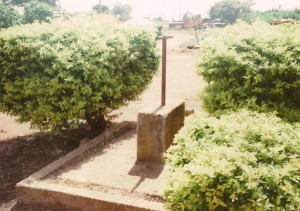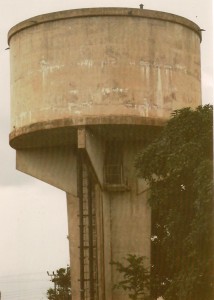- Advertisement -
The last time residents of Ewohimi town in Esan South East Local Government Area of Edo State fetched potable water from the dispensing pumps installed in strategic locations across the community by the state-owned Water Board was over a decade ago.

Ewohimi, an ancient town with a population of over 25,000 people, is the largest town in Esan South East Local Government Area. Geographically, the town lies approximately 60 kilometers west of the River Niger from Asaba and about 200 kilometers South of the Niger from the Lokoja axis.
Interestingly, the community which is also second to Uromi in population and size amongst the entities that constitute the area of the state popularly referred to as Esanland, once had a functional pipe-borne water scheme that was rated as one of best in the area in terms of efficiency, water quality and service delivery to the people.

Unfortunately, the town’s golden era could not be sustained as water supply gradually plummeted till it went completely comatose. Consequently, relics of the facilities which visibly adorn the streets in their rusty and dilapidated forms are all that is left for first-time visitors and the children born and raised in the community within the last 10 years to relate to presently.
Meanwhile, residents who were old enough and privileged to witness the development then, have never stopped relishing the experience nostalgically. They proudly tell whoever cares to listen about the ‘good old days’ but the reality today is that the people have, all along, suffered the indignities resulting from relying on water from not too hygienic sources as an alternative for their drinking and domestic uses since things fell apart.
A cross section of the residents who spoke in an interview, disclosed that the public water supply has been grounded completely in Ewohimi since 1999 after functioning epileptically for some time. They however added that successive administrations in the state have made faint-hearted attempts to rehabilitate it but all to no avail.
Worse still, there is presently no functional borehole as an alternative source of water supply in the entire community. Against this backdrop, majority of the residents resort to drinking ill-treated sachet water popularly called ‘pure water’ or buy water in jerry-cans and buckets from those who sell from cemented wells in their compounds while some go through the Herculean hassle of fetching ‘clean’ water from pockets of rivers and streams located several miles away.
While bearing her mind on the development, Mrs Veronica Udo, a mother of six, lamented that the perennial scarcity of water in the community was causing additional economic hardship in most households, adding that an average family now spends between N500 to N1,000 weekly on water for drinking and domestic uses.
Speaking in the same vein, Mr. Henry Itama, a resident who is a retiree, observed that what they are going through in Ewohimi can be likened to the proverbial ‘Paradise Lost’ because, quite unlike many communities in Esanland which never had the good fortune of assessing reliable supply of pipe-borne water, they never witnessed water problem until the system collapsed due to poor management by the authorities.
Ewohimi, according to him, had the best treated water in the 1970s, 1980s as well as the greater part of 1990s, adding that easy and regular access to potable water inadvertently brought about healthy and hygienic living standard in the whole community.
“It is very pathetic that we have retrogressed badly in this town. It is incredible that people now drink water from sources that are anything but potable. Some of us cannot afford to even have a good bathe after a hard day’s job in the farm, especially during dry the season here,” he said.
He also noted that the lack of potable water is taking its toll on the health of the residents, adding that water-related diseases have been on the increase lately in the community which, he said, also suffers from the absence of a well equipped primary health care centres.
Lending credence to this, Rev. Patrick Ulinkhifun, an opinion leader and native of the town, said the protracted Ewohimi water project saga which has assumed a worrisome and nauseating dimension, particularly when viewed against the background of its adverse effect on the wellbeing of the residents who, according to him, have been suffering in silence, over the years.
Rev. Ulinkhifun observed that the indifference and apathy so far displayed by the authorities in charge of the project, has not only compounded the problem but makes it appear insurmountable in terms of what it will cost it to revamp it completely when all the facilities seem to have decayed beyond repair.
“The problem looks mysterious to me because I cannot comprehend why those who are supposed to fix it are idling away doing nothing about it. We need a miracle to turn things around here. God’s intervention seems to be the only way out of this problem,” he added.
He also attributed the problem to bad leadership at both the local and state levels, adding that there is no where societal problems can be redressed when those in authority are corrupt, greedy, selfish, wicked and morally bankrupt.
“The last time we saw sincere efforts to address the problem was when a prominent politician from Ewohimi, the late Hon. David Aimenbelomon, served as caretaker chairman at the local government council. He tried to revive it but the water ran in some parts of the town for a while before it stopped and we lost it again till today,” he further disclosed.
Corroborating this, Chief Robert Enoselease, a ranking palace chief, attributed the lingering problem of resuscitating the water supply in the community to what he described as the lackadaisical attitude and neglect on the part of government to redress the situation.
Chief Enoselease, who is the Ihaza of Ewohimi Kingdom, noted that the desired interventions from the government geared towards solving the problem over the years, have not been too encouraging in terms genuine and unflinching commitment to fix it and manage the facilities in a sustainable manner in the interest of the people.
The Ihaza who represents Idumijie community at the palace of the Enogie of Ewohimi Kingdom, His Royal Highness, Lord Peter Ogiefoh Usifoh II, also stated that residents of the community have been very desirous, supportive and committed to making it work efficiently and effectively.
“At a point, residents had to task themselves through the collection of levies in order to collectively contribute funds for the purchase of gas to power the pumping plant here in the Water Board office for a period of about four years just to keep it running,” he stressed.
He however expressed optimism that the present efforts by the Governor Adams Oshiomole’s administration to fast-track the rehabilitation of the Ewohimi Iyagun Water Supply Scheme may turn things around for good and put smile on the faces of the residents once again.
“As you can see, the new contractor handling the project is presently digging up the old pipes and replacing them with plastic ones but let us keep our fingers crossed and hope for the best,” he further assured.
By Eric Ojo
The article was initiated courtesy of the Pro-poor WASH Stories Project implemented by the Water and Sanitation Media Network Nigeria, with the support of West Africa WASH Media Network, WaterAid, and Water Supply and Sanitation Collaborative Council.
